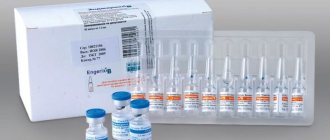Compatibility with other vaccines
Vaccination against mumps can be carried out simultaneously (on the same day) with other vaccinations included in the National Vaccination Calendar (vaccinations against measles, rubella, polio, hepatitis B, whooping cough, diphtheria, tetanus, influenza, Haemophilus influenzae) provided they are administered in different areas body or no earlier than 1 month after the previous vaccination. After the administration of human immunoglobulin preparations, vaccinations against mumps are carried out no earlier than 2 months later. After administration of the Mumps vaccine, immunoglobulin preparations can be administered no earlier than 2 weeks later. If it is necessary to use immunoglobulin earlier than this period, vaccination against mumps should be repeated.
Measles, mumps, rubella (MMR) vaccine
Why is vaccination necessary?
Measles, mumps, rubella are quite serious diseases.
- Measles
The measles virus causes a rash, cough, runny nose, eye inflammation, and fever. The disease can cause eye infections, pneumonia, seizures (convulsions and bulging eyes), brain damage, and even death.
- Mumps
The mumps virus causes fever, headache and swollen lymph nodes. · Complications that may arise from mumps include deafness, meningitis (an infection of the lining of the brain and spinal cord), painful enlargement of the testicles or ovaries, and in rare cases, death.
- Rubella (German measles)
The rubella virus causes a rash, mild fever, and arthritis (mostly in women). · If a woman gets rubella during pregnancy, the disease can cause serious congenital pathologies in the child. A woman can have an abortion if she wishes. You or your child can get rubella from contact with sick people. The disease is transmitted by airborne droplets from person to person. The measles, mumps, rubella (MMR) vaccine can prevent these diseases.
Most children who are immunized with the MMR vaccine do not get measles, mumps, or rubella. With the cessation of vaccination, the incidence rate will increase significantly, especially among children.
Who should be immunized with the MMR vaccine and when?
Children are vaccinated with the MMR vaccine in two stages:
- First dose – at 12 months
- The second - at 6 years old.
Vaccination is recommended during the above age periods. However, children can receive a second dose of the vaccine at any age, provided that at least 28 days have passed since the first vaccination.
Some adults should also be immunized with the MMR vaccine:
- People 18 years of age and older who were born after 1956 should be vaccinated with at least one dose of MMR vaccine, unless they have been vaccinated or have had these diseases.
Health professionals can provide you with more information. MMR vaccine can be used with other vaccines at the same time.
Note: A combination vaccine called MRCV vaccine, which includes two vaccines, MRCV vaccine and varicella vaccine, can be used instead of the two separate vaccines to immunize children under 12 years of age.
Some people cannot be vaccinated with the MMR vaccine or should wait to receive the vaccine:
- People who have a severe allergic reaction to gelatine, the antibiotic neomycin, or who have had an allergy to the MMR vaccine in the past cannot receive the MMR vaccine.
- People who have moderate or severe illness at the time of routine vaccination cannot be vaccinated. Vaccination is carried out after complete recovery.
- Pregnant women should not get vaccinated. Vaccination is carried out after childbirth. After immunization with the MMR vaccine, women should avoid pregnancy for 4 weeks.
Some people should consult their doctor about the advisability of vaccination with the MMR vaccine:
- People diagnosed with HIV/AIDS or other diseases that affect the immune system.
- People who are being treated with drugs that affect the immune system, such as steroids, for 2 weeks or longer.
- People suffering from cancer.
- People who are being treated for cancer with radiation therapy or medications.
- People who have ever had blood disorders (such as low platelet counts).
- People who have recently had a blood transfusion or other blood products should consult their doctor before receiving the MMR vaccine.
Health professionals can provide you with more information.
What complications can arise from vaccination with the MMR vaccine?
A vaccine, like any other medicine, can cause serious complications, such as severe allergic reactions. The risk of serious complications or death due to MMR vaccine is very low. Getting vaccinated with the MMR vaccine is safer than getting any of these diseases. Most people who receive the MMR vaccine do not experience any complications.
Next »
Contraindications
Only a doctor can decide whether Mumps is suitable for vaccination
The Mumps vaccine is contraindicated if there is a history of an allergic reaction to any component of the vaccine, as well as in cases where the patient:
- Anaphylactic reactions or severe forms of allergic reactions to aminoglycosides (gentamicin sulfate), chicken and/or quail eggs have previously been observed.
- There are primary immunodeficiency states, malignant blood diseases and neoplasms.
- A previous severe reaction (temperature rise above 40 C, hyperemia and/or swelling more than 8 cm in diameter at the site of vaccine administration) or a complication to a previous administration of mumps or mumps-measles vaccines has been observed.
- Pregnancy and breastfeeding period.
- Acute diseases or exacerbation of chronic diseases.
How to recognize an infection
Typically, two to three weeks pass between the moment of infection and the appearance of the first symptoms of mumps. During this time, the virus spreads in the body, affecting mainly glandular organs. 1-2 days before the manifestation of clinical signs, the patient may feel typical signs of infectious intoxication - headache, chills, malaise, muscle pain, a feeling of malaise and weakness, loss of appetite.
Penetration of the virus into the cells of the salivary gland leads to its inflammation, which is externally expressed in the characteristic swelling of the neck and post-auricular area. The tumor is accompanied by painful sensations that intensify when chewing and during conversation, as well as dry mouth due to deterioration of salivary function. The swelling persists for several days, and then gradually decreases and disappears. The total duration of the disease is two, less often three weeks.
Currently, up to 50% of cases of the disease are characterized by mild symptoms or an asymptomatic course. However, the patient, regardless of the presence of external signs, actively releases the virus into the environment and poses a danger to others. The risk of infection increases:
- in people who refuse vaccination;
- in spring and autumn due to a general decrease in immunity during these periods;
- with frequent colds;
- in patients undergoing a long course of treatment with antibiotics or hormonal drugs;
- in people with chronic diseases;
- with unbalanced, irregular or insufficient nutrition;
- if the rules of personal hygiene and quarantine precautions are not observed, especially during contact with a sick person.
The disease is characterized by high contagiousness; after illness or vaccination, stable, long-term immunity is formed. Mumps in children is quite mild, while adults tolerate the disease much worse: swelling of the salivary gland often persists for two weeks or even longer.
Are you experiencing symptoms of mumps (mumps)?
Only a doctor can accurately diagnose the disease. Don't delay your consultation - call
Possible side effects
- Often, in the period from 5 to 15 days after vaccination, a short-term slight increase in body temperature and catarrhal phenomena in the nasopharynx (mild hyperemia of the pharynx, rhinitis) occur. An increase in body temperature above 38.5 C in the post-vaccination period is an indication for the prescription of antipyretics.
- Rarely, in the first two days after vaccination, local reactions occur, expressed in skin hyperemia and mild swelling at the site of vaccine administration, which go away without treatment. In the period from 5 to 42 days from the moment of vaccination, a slight increase in the parotid salivary glands may occur, which goes away on its own within 2-3 days. Restlessness, lethargy, and sleep disturbances may also occur.
- Very rarely, allergic reactions appear in the first two days. In the period after 2-4 weeks - benign serous meningitis or painful short-term swelling of the testicles.
Considering the possibility of developing immediate allergic reactions (anaphylactic shock, Quincke's edema, urticaria) in particularly sensitive individuals, vaccinated persons must be provided with medical supervision for 30 minutes.
Come get vaccinated at VIRILIS. A full range of vaccines for children and adults, family vaccinations - at a special price!
Treatment methods for mumps (mumps)
In case of complicated forms of mumps, hospitalization is required. In less severe cases, treatment is carried out at home. If you notice symptoms of mumps in your child, call a pediatrician at home.
Treatment for mumps (mumps) includes:
- bed rest (for the first 10 days of illness, the patient should, if possible, stay in bed, avoid physical and emotional stress and hypothermia),
- a diet that includes foods that are well digestible and do not require large amounts of pancreatic enzymes (reduces the risk of developing pancreatitis),
- drug treatment.
After the symptoms of mumps go away, the child must be examined to make sure that the disease has not caused complications.
Symptomatic treatment
For mumps, symptomatic treatment is carried out. Anti-inflammatory, antipyretic, and desensitizing drugs are used. Analgesics and pancreatic enzyme preparations are also prescribed.
Vaccination
In order not to expose children to the risk of disease, preventive vaccinations against mumps are given in Russia. In accordance with the National and Regional calendars of preventive vaccinations, vaccination against mumps (mumps) is carried out at the age of 12 months. Revaccination is carried out at the age of 6 years.
By contacting the Family Doctor about vaccination against mumps, you guarantee that the vaccine will be of high quality, and the actions of the medical staff will be professional and qualified.
You should contact your pediatrician for a referral for vaccination.
More information about the treatment method
Make an appointment Do not self-medicate. Contact our specialists who will correctly diagnose and prescribe treatment.
Rate how useful the material was
thank you for rating
Why does mumps occur?
In a child who has not been vaccinated against mumps, the immunity against this virus is weakened several dozen times. As a result, when meeting a carrier of the disease, he is highly likely to become infected. If a child gets mumps after being vaccinated against this disease, then it will be much more harmless:
- children unvaccinated against mumps become infected in 98% of cases upon contact with the virus;
- 70% of unvaccinated people develop complications - infertility in boys (every 3 children), as well as deafness.
Among the common causes of the disease, one can also highlight seasonality - in the spring, children who have not been vaccinated become infected more often, since their immunity is weakened. But children with reduced immune system function are a special risk group, in whom pathology can occur after any vaccination. Factors that increase risk include:
- age from 3 to 15 years;
- constant presence in crowded places (small areas);
- hypovitaminosis;
- frequent illnesses;
- hormonal and antibacterial therapy;
- chronic organ diseases.
Determining mumps is quite simple, since its specific symptoms are difficult to confuse with other diseases.
Long-term consequences of mumps
If the symptoms of mumps in children after vaccination were not noticed in time, then without treatment the child may face serious pathologies in the future. With mumps, not only the salivary glands are affected, but also other organs with a similar operating principle. Hence it turns out that severe complications, the spread of the disease to neighboring tissues, may not appear immediately. Here's what a baby can expect without mumps cured in time:
- Secondary infection a few weeks after contracting mumps. Possible death.
- In boys and men, a month after the infection, testicular disease and atrophy may occur, which leads to infertility. You can get mumps up to 30 years of age, especially if you stay in close social spaces (barracks, dormitories).
- Deafness is a common consequence that occurs as a result of otitis media that appears after mumps.
- Myocarditis is a heart disease that can appear even after several months.
- Nephritis is a kidney pathology that is diagnosed at different times after an illness.
- Mastitis in women, as well as diseases of the thyroid gland - it is located close to the main location of the disease. In women at a later age, the gonads may become inflamed.
- Arthritis is also considered a consequence of mumps.
- In rare situations, mumps triggers the development of diabetes.
For you: Vaccination schedule for adults: what viruses need to be protected from
Chronic mumps practically does not occur, but sometimes a similar diagnosis can be found in the presence of other infections in the parotid area.







